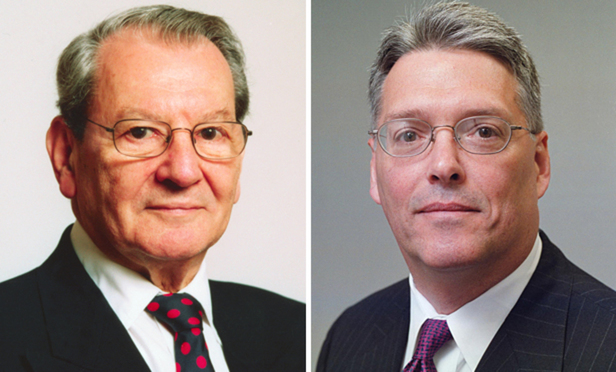Steven J Ahmuty Jr

May 07, 2014 | New York Law Journal
Pre-Argument Statements and ConferencesIn their Appellate Practice column, Thomas R. Newman and Steven J. Ahmuty, Jr. discuss the rules and procedures of the pre-argument conference, which can help participants more objectively evaluate the strengths and weaknesses of their case; generate new ideas and options for settlement; reduce tensions between the participants; deal with procedural problems; and eliminate or clarify issues.
By Thomas R. Newman and Steven J. Ahmuty, Jr.
8 minute read

March 07, 2014 | New York Law Journal
Factual Disagreements Between Trial and Appellate CourtsIn their Appellate Practice column, Thomas R. Newman, of counsel to Duane Morris, and Steven J. Ahmuty Jr., a partner at Shaub, Ahmuty, Citrin & Spratt, examine 'Rocky Point Drive-In v. Town of Brookhaven,' in which the Court of Appeals granted the appellant's motion for leave to appeal in a case involving different factual findings of the trial court and Appellate Division on the same record, but limited its review to which factual findings more nearly comported with the weight of the evidence.
By Thomas R. Newman and Steven J. Ahmuty, Jr.
10 minute read

November 06, 2013 | New York Law Journal
Grappling With the Mootness Doctrine in AppealsIn their Appellate Practice column, Thomas R. Newman, of counsel to Duane Morris, and Steven J. Ahmuty Jr., a partner at Shaub, Ahmuty, Citrin & Spratt, review the mootness doctrine, a recent example illustrating the 'recurring issue' exception and when vacatur is appropriate use of discretion following mootness.
By Thomas R. Newman and Steven J. Ahmuty Jr.
11 minute read

January 03, 2007 | New York Law Journal
Appellate PracticeThomas R. Newman, of counsel to Duane Morris, and Steven J. Ahmuty Jr., a partner at Shaub, Ahmuty, Citrin & Spratt, examine Estevez-Yalcin v. The Children's Village Inc., which contains an excellent discussion of the rigorous certification criteria for federal interlocutory appeals under 28 USC �1292(b).
By Thomas R. Newman and Steven J. Ahmuty Jr.
11 minute read

January 04, 2012 | New York Law Journal
Restriction of Court of Appeals' Jurisdiction in Pedestrian Stop CasesIn their Appellate Practice feature, Thomas R. Newman of Duane Morris and Steven J. Ahmuty Jr. of Shaub, Ahmuty, Citrin & Spratt write that the Court of Appeals did not clarify the thousands of annual pedestrian stops performed by the NYPD in People v. Holland, and should have reached a determination on the merits, rather than avoid the issue by a cramped view of its jurisdiction.
By Thomas R. Newman and Steven J. Ahmuty Jr.
11 minute read

November 08, 2012 | New York Law Journal
The 'Necessarily Affects' Requirement of CPLR 5501In their Appellate Practice column, Thomas R. Newman, of counsel to Duane Morris, and Steven J. Ahmuty Jr., a partner at Shaub, Ahmuty, Citrin & Spratt, analyze a recent Court of Appeals ruling which clarified the "necessarily affects" requirement of section 5501(a)(1) in the context of a nonfinal order dismissing the defendants' counterclaims and third-party complaint.
By Thomas R. Newman and Steven J. Ahmuty Jr.
12 minute read

May 02, 2012 | New York Law Journal
Form and Content of Appellate BriefsIn their Appellate practice column, Thomas R. Newman, of counsel to Duane Morris, and Steven J. Ahmuty Jr., a partner at Shaub, Ahmuty, Citrin & Spratt, write that practitioners familiar with the rules in one court cannot assume that they will be the same in another: There are differences and, in each case, the rules of the court to which the appeal is taken should be consulted.
By Thomas R. Newman and Steven J. Ahmuty Jr.
11 minute read

March 07, 2012 | New York Law Journal
Supreme Court to Review Harmless Error StandardIn their Appellate Practice column, Thomas R. Newman, of counsel to Duane Morris, and Steven J. Ahmuty Jr., a partner at Shaub, Ahmuty, Citrin & Spratt, discuss a question soon to be decided by the high court: Should an appellate court conducting harmless error analysis consider only the weight of the residual evidence absent the error, or should it also consider the potential effect of the error on the jury?
By Thomas R. Newman and Steven J. Ahmuty Jr.
10 minute read

April 23, 2013 | New York Law Journal
Review of Non-Final Judgments and OrdersIn their Appellate Practice column, Thomas R. Newman. of counsel to Duane Morris, and Steven J. Ahmuty Jr., a partner at Shaub, Ahmuty, Citrin & Spratt, analyze the decision in 'Oakes v. Patel,' in which the Court of Appeals held that a party who wants to challenge on appeal a trial court's post-verdict order conditionally changing the amount of damages awarded by a jury (an additur or remittitur) must do so before a new trial on damages takes place, and that an order granting or denying a motion to amend qualifies for review under CPLR 5501(a)(1) when it relates to a proposed new pleading that contains a new cause of action or defense.
By Thomas R. Newman and Steven J. Ahmuty Jr.
11 minute read

September 05, 2012 | New York Law Journal
Are Appellate Term Decisions Binding Precedents?In their Appellate Practice column, Thomas R. Newman, of counsel to Duane Morris, and Steven J. Ahmuty Jr., a partner at Shaub, Ahmuty, Citrin & Spratt, examine 'People v. Burgos,' in which Justice Marcy Kahn of the Supreme Court, New York County, declined to follow a decision of the Appellate Term, First Department, on the ground that decisions of the Appellate Term are not binding on the Supreme Court, even if issued within the same judicial department.
By Thomas R. Newman and Steven J. Ahmuty Jr.
9 minute read
More from ALM
- Legal Speak at General Counsel Conference East 2024: Match Group's Katie Dugan & Herrick's Carol Goodman 1 minute read
- Legal Speak at General Counsel Conference East 2024: Eric Wall, Executive VP, Syllo 1 minute read
- Legal Speak at General Counsel Conference East 2024: Virginia Griffith, Director of Business Development at OutsideGC 1 minute read



